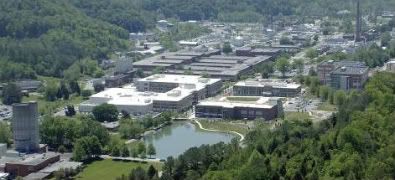ORNL chooses biomass to power its campuses

The fact that such a major research organisation, with 4,200 staff, 3,000 guest researchers, 20 user facilities, and a budget of approximately $1.2 billion, chooses biomass as the energy source of its greener future, is highly significant.
The project is the first signed initiative of the U.S. Department of Energy's Transformational Energy Action Management (TEAM) Initiative, which is an action plan to dramatically transform the DOE's energy, environmental and transportation management. TEAM aims to meet or exceed the aggressive energy efficiency goals set forth by the federal government laid out by President Bush, fundamentally transforming the way the DOE manages energy use in its facilities.
Oak Ridge National Laboratory will achieve its long-term energy reduction goals far earlier than expected while saving millions of taxpayer dollars. We are dedicated to alternative energy sources. Being able to tap renewable energy for our facility is a great way to see our purpose realized. - ORNL Director Thom MasonAs the project's cornerstone, a $40 million biomass gasification system with a 'super boiler' will take the place of the existing natural gas steam plant and steam distribution system. By using woody biomass from the region as the main energy source for the facilities, ORNL will reduce fossil fuel consumption by 80 percent. Furthermore, the biomass plant significantly reduces greenhouse gas emissions equal to planting 32 million trees.
The new boiler system will require construction of two new buildings, a 10,000-square-foot structure for the boiler system and another 14,000-square-foot facility for handling the biomass. Both buildings will be located on the central campus behind the lab's existing steam plant, also to be refurbished as part of the project:
 energy :: sustainability :: biomass :: bioenergy :: biofuels :: energy efficiency :: conservation :: renewables :: ORNL ::
energy :: sustainability :: biomass :: bioenergy :: biofuels :: energy efficiency :: conservation :: renewables :: ORNL :: Wood that will fuel the Cleaver Brook super boiler will come from suppliers within a 50-mile radius of ORNL. That could include waste tree bark from timber mills or refuse from pallet manufacturers. Johnson Controls conducted a study to determine which biomass sources were most readily available. The biomass supply contracts will be managed by the lab.
Overall, ORNL will benefit from an innovative suite of energy efficiency solutions including the installation of the 'super boiler', advanced electric metering, energy efficient lighting, water conservation measures, compressed air cooling, comprehensive HVAC improvements and a building management system to ensure the mission critical standards are maintained.
By eliminating more than 1.5 miles of steam piping and using enhanced technology, the "super boiler" will be up to 94 percent efficient. This is a significant improvement when compared to traditional boilers which operate 50 to 60 percent efficiently. The water conservation measures will also reduce water usage by more than 115 million gallons annually, resulting in a long-term reduction of 16 percent. As a whole, the entire project will reduce energy intensity in the labs and office buildings by 30 percent, meeting ORNL's long-term energy reduction goal and significantly contributing to the goals of the Team initiative.
It is estimated that the biomass gasification system, "super boiler" and energy efficiency improvements will generate $8 million annually in energy and operational savings. As a result, ORNL expects to save more than $144 million over the 18-year term of the contract.
Hundreds of projects across North America, including the ORNL project, are financed through a performance guarantee with Johnson Controls. Performance guarantees are a feature of performance-based contracting, which allows a customer to make system improvements that are self-funding via cost savings. Under such a contract, the cost of facility and infrastructure upgrades is paid for over a specified number of years by the energy, water and operational cost savings the project generates. Johnson Controls guarantees all or a portion of these savings under the terms of the contract, which range in length from three to 25 years, depending on the customer's preference.
ORNL is a multi-program science and technology laboratory managed for the U.S. Department of Energy by UT-Battelle, LLC. Scientists and engineers at ORNL conduct basic and applied research and development to create scientific knowledge and technological solutions that strengthen the nation's leadership in key areas of science; increase the availability of clean, abundant energy; restore and protect the environment; and contribute to national security.
With 4,200 staff, 3,000 guest researchers, 20 user facilities, and a budget of approximately $1.2 billion, ORNL supports the Department of Energy's mission through six major scientific competencies in energy, neutron science, high-performance computing, complex biological systems, materials research, and national security.
References:
Johnson Controls: Johnson Controls to Harness Renewable Energy, Improve Energy Conservation Measures for Oak Ridge National Laboratories - August 11, 2008.
Knoxville Biz: Steam plant to be replaced by biomass - $88.1 million ORNL project includes efficiency efforts - August 12, 2008.
 --------------
--------------
 Mongabay, a leading resource for news and perspectives on environmental and conservation issues related to the tropics, has launched Tropical Conservation Science - a new, open access academic e-journal. It will cover a wide variety of scientific and social studies on tropical ecosystems, their biodiversity and the threats posed to them.
Mongabay, a leading resource for news and perspectives on environmental and conservation issues related to the tropics, has launched Tropical Conservation Science - a new, open access academic e-journal. It will cover a wide variety of scientific and social studies on tropical ecosystems, their biodiversity and the threats posed to them.









1 Comments:
I guess they are not aware of a high efficiency, clean burning, biomass power plant that is in their own backyard.
www.biotenpower.com
Post a Comment
Links to this post:
Create a Link
<< Home